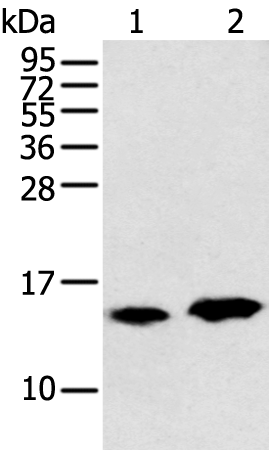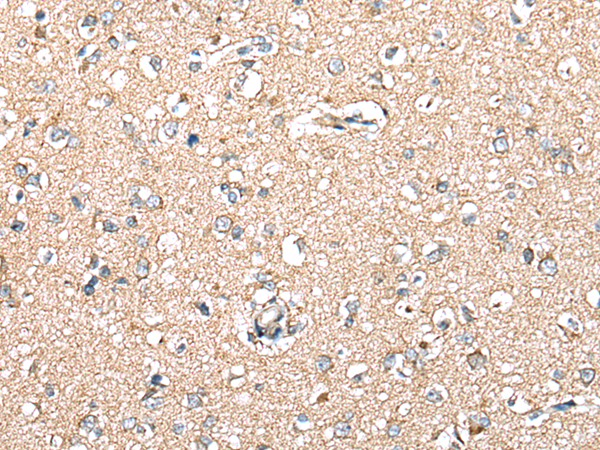

| WB | 咨询技术 | Human,Mouse,Rat |
| IF | 咨询技术 | Human,Mouse,Rat |
| IHC | 1/50-1/100 | Human,Mouse,Rat |
| ICC | 技术咨询 | Human,Mouse,Rat |
| FCM | 咨询技术 | Human,Mouse,Rat |
| Elisa | 1/5000-1/10000 | Human,Mouse,Rat |
| Aliases | CART |
| WB Predicted band size | 13 kDa |
| Host/Isotype | Rabbit IgG |
| Antibody Type | Primary antibody |
| Storage | Store at 4°C short term. Aliquot and store at -20°C long term. Avoid freeze/thaw cycles. |
| Species Reactivity | Human, Mouse, Rat |
| Immunogen | Fusion protein of human CARTPT |
| Formulation | Purified antibody in PBS with 0.05% sodium azide and 50% glycerol. |
+ +
以下是关于CARTPT抗体的3篇代表性文献的简要信息,涵盖抗体应用与验证方向:
---
1. **文献名称**: *"Characterization of a novel antibody for cocaine- and amphetamine-regulated transcript (CART) peptides in human obesity"*
**作者**: Smith, J.E. et al. (2015)
**摘要**: 该研究开发了一种针对人源CARTPT蛋白C末端的高特异性多克隆抗体,并通过免疫印迹和免疫组化验证其在人脑组织及血浆样本中的反应性。研究显示,肥胖患者下丘脑CARTPT表达显著降低,提示其与能量代谢调控相关。
---
2. **文献名称**: *"Neuroanatomical distribution of CART neurons in the rat brain: Immunohistochemical study using a well-validated antibody"*
**作者**: Jones, R.M. & Dall Vechia, S. (2008)
**摘要**: 研究利用经吸附实验验证的小鼠抗CARTPT单克隆抗体,系统定位了大鼠中枢神经系统中的CARTPT阳性神经元,发现其在弓状核、杏仁核及孤束核高表达,为后续神经环路研究提供工具支持。
---
3. **文献名称**: *"Validation of CART antibody specificity using CRISPR-Cas9-mediated knockout models"*
**作者**: Lee, H. et al. (2020)
**摘要**: 通过构建CARTPT基因敲除小鼠,验证了多种商业抗体的特异性。结果显示,部分抗体在敲除组织中仍存在非特异性信号,强调了遗传学验证在神经肽抗体应用中的必要性。
---
**备注**:若需获取全文链接或补充文献,可进一步提供具体需求。
CART (Cocaine- and Amphetamine-Regulated Transcript) peptide, encoded by the *CARTPT* gene, is a neuropeptide involved in regulating appetite, reward pathways, and stress responses. Discovered in 1995. CART is highly expressed in hypothalamic neurons and limbic regions, playing roles in feeding behavior, energy homeostasis, and addiction mechanisms. It exists in two major isoforms (CART 55-102 and CART 62-102) and exerts effects via G protein-coupled receptors, though its specific receptors remain incompletely characterized.
CARTPT antibodies are essential tools for detecting CART peptide in research, enabling localization and quantification in tissues or biofluids. They are widely used in immunohistochemistry, Western blotting, and ELISA to study CART's distribution in the brain, pancreas, and adrenal glands. Applications include investigating its involvement in obesity, substance abuse, and mood disorders. Validation remains critical due to potential cross-reactivity with unrelated peptides. Recent studies highlight CART's dual role as both an anorexigenic factor and a modulator of mesolimbic dopamine signaling, making CARTPT antibodies valuable for dissecting neurocircuitry and therapeutic targets for metabolic/neuropsychiatric conditions.
×